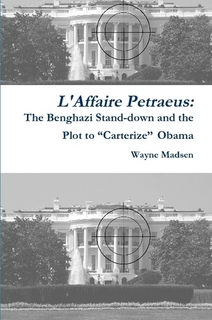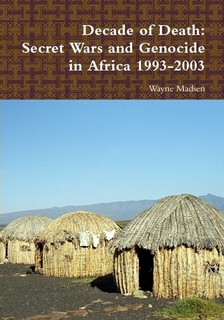October 18-19, 2016 -- GUEST ARTICLE: Benghazi, Gold for Arms – Libya, Syria, South Sudan and East Africa
publication date: Oct 17, 2016
October 18-19, 2016 -- Benghazi, Gold for Arms – Libya, Syria, South Sudan and East Africa By Moeen Raoof
On 7 or 8 September 2012, a cargo freighter departed the Libyan port of Benghazi. On board were two containers, guarded by mercenaries, contents and destination unknown. Days later, on September 11, 2012, an attack on the U.S. Consulate resulted in the deaths of the U.S. ambassador and several U.S. Citizens, labeled as the “Battle of Benghazi." The attack on the Consulate in Benghazi, and the two secret containers played a role that was not only bizarre, but also has repercussions for the current U.S. presidential election, in particular Hillary Clinton, standing for the Democrats as their candidate. The Benghazi plot involved the newly formed state of the South Sudan and its neighbours, Uganda and Kenya, a hotel in Nairobi that has a very controversial past and role to play, as well as "Arms for Gold" to Syria, which included Somali pirates and Israeli and Ethiopian arms sellers.The contents of the two containers was later discovered to be gold, specifically gold bars belonging to the Libyan Sovereign Fund, shipped out of secure storage facilities outside the Libyan capital, Tripoli, to Benghazi and placed on board a cargo freighter without the authority of the then Libyan so-called government. This may have prompted the attack on the U.S. Consulate days later. The cargo freighter was stuck outside the waters of the island of Malta after the “Battle of Benghazi,” possibly for up to 6-weeks, after which the cargo freighter sailed toward the port of Mombasa, in Kenya. There, the two containers were off-loaded for shipment by air from Mombasa to Entebbe Airport in Uganda, located on the outskirts of Kampala. The gold was destined for Uganda, via the port of Mombasa in Kenya, to be melted down in smelting plants located in Uganda near the Democratic Republic of Congo (DRC) and to make it appear that the metals originated out of the DRC or Angola, as well as to eliminate all markings regarding the origins. The gold bars contained both Swiss and Libyan markings. After the melting down, the gold was to be sold as DRC or Angolan gold on the open market, proceeds of which were to be used to pay for arms, including Soviet-era T-62 Tanks, AK-47 Rifles, RPGs and ammunition rounds that were lying in the port of Mombasa, and originally destined for South Sudan. The weapons were now to be rerouted to Syria via Turkey due to the fact that the shipment containing weapons and tanks was detained in the Port of Mombasa due to non-payment of port charges that resulted after the shippers refused to open the containers for inspection. The ownership on the paperwork was marked as government of Uganda, but the shippers insisted that the cargo was destined for South Sudan. This aroused suspicion, hence the detention of the cargo at the port of Mombasa. A new twist in the cargo saga opened up when the gold containers that had arrived in the port of Mombasa via Malta, was also detained as its paperwork also aroused suspicion. However, the office of the President of Uganda intervened in the matter in an attempt to get the two containers cleared for shipment. But a keen Kenyan Ports Authority officer insisted on opening of the two containers for inspection. In another twist to this most bizarre saga, the U.S. Embassy in Kenya also intervened in the matter of the two containers. This, too, was ignored and the containers were opened and the gold bars were discovered instead of spare parts for government of Uganda, as was indicated on the shipping papers. Both the arms and gold shipments containers remained in the port of Mombasa until the early part of 2014 when a new twist in the form of intervention took place and played out in the Grand Regency Hotel in Nairobi, Kenya. A former British Foreign and Commonwealth Office diplomat, Reza Afshar met with a Ugandan national in the Grand Regency Hotel in Nairobi in an attempt to sort out the issue of the shipments stuck in the Port of Mombasa. Mr. Afshar met with a woman who is rumoured to be related to the President of Uganda, Yoweri Museveni. The choice of meeting in this very hotel was just as bizarre as the rest of the saga, as this hotel played a major role in not one, but two major scandals. The first was the biggest scandal in Kenyan history and involved gold and Kenyan government subsidies known as the “Goldenberg Scandal.” The second involved the sale of the Grand Regency Hotel to an investment group known as the “Libyan-Arab African Investment Company” at less than the current market value in 2008. The choice of hotel as a meeting place between Reza Afshar and the Ugandan representing the Ugandan President was either inadvertent or ironic. Reza Afshar, whose credentials include lead negotiator on Libya in the UN Security Council, contributed in the passing of UNSCR-1973 that led to NATO action during 2011, as well as head of UK FCO with responsibility for Syria policy. Afshar attempted to get the shipments freed from the port of Mombasa so that it could be transported by sea to a port in Turkey and onward to rebels in the north of Syria, In particular, the arms and tanks were earmarked for rebel groups in Aleppo. These were groups that Afshar was representing on the diplomatic front while negotiating arms shipments. Shortly after this meeting, all containers held in the port of Mombasa, with arms, tanks, RPGs, ammunition and the two containers of gold were shipped-out of Kenya for an unknown destination. Whether the port charges were settled in full was not disclosed, but the port official was posted out to a remote area of Kenya as a consequence to this ongoing saga. After the meeting in Nairobi, Mr. Afshar met in London with Saleyha Ahsan, who claims to be a doctor and is a Sandhurst graduate, becoming the first Muslim woman to be commissioned in the British Army. Ahsan, whose previous role was to provide arms and logistics assistance to the Libyan rebels during the so-called Arab Spring, while based in Benghazi, was now actively supporting the rebels in Syria. She was also coordinating the training of rebels in the UK in the use of arms, battlefield first aid, as well as the running of British Muslim jihadists traveling out to Syria in road convoys involving second-hand British ambulances. This was a sequel to her previous active role in Libya. Shortly after the meeting between Afshar and Ahsan, the latter proceeded to Turkey where she received several containers from Kenya. These containers, Ahsan claimed, were medical equipment, operation theatre equipment, medicines and other related equipment. Once cleared, the containers were shipped out to the Turkey-Syria Border and handed-over to rebels who used the weapons to hold on to towns and cities, as well as areas, thanks to the intervention of all involved, including the sacrifice of a U.S. ambassador in Benghazi. --------------- Note 1: The author has since learned that 143-tons of gold and silver worth approximately US$7 billion is now missing from Libya. This ties in with the shipment of gold out of Benghazi shortly before the attacks took place on the U.S. Consulate in Benghazi. It is also a widely reported story that Libya intended to use its vast reserves of gold to create a gold-backed African Dinar to directly challenge the U.S. Dollar before Muammar Qaddafi was toppled in 2011. Note 2: Sources for most of this information are exiles living in fear for their lives if their identities are revealed. Some worked in the port of Benghazi and were witnesses to the loading of containers that were considered valuable, by U.S. military contractors in September of 2012. Other sources took part in ambulance convoys that posed as humanitarian assistance for the people of Syria, but were actually transporting jihadists trained in arms and battlefield first aid in the UK, then shipped out to fight in the north of Syria. The ambulances that were second-hand purchased from generous donations from concerned Muslim-British citizens were used to smuggle arms and ammunition into Syria.
Moeen has in the past also undertaken an investigation of the President Bush Yellowcake/Iraq claim prior to the Iraq invasion by travelling to the Agadez region of Niger at the same time as Ambassador Joseph Wilson’s mission. http://www.globalresearch.ca/mali-s-tuareg-uranium-conspiracy/30118
|
Login HereSearch the site |














